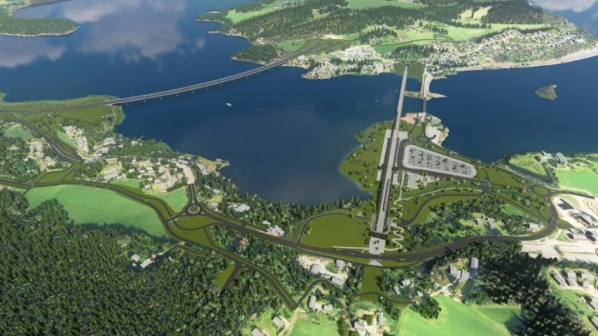THE Norwegian government has published the results of an independent quality assessment of the combined Ringerike Line and E16 highway project, which outlined a series of recommendations that could reduce the cost by NKr 4bn ($US 473.5m).
The Ringerike Line is a proposed 40km extension to the Bergen line from Hønefoss to Sandvika, which will offer a more direct route between Oslo and Bergen, reducing travel times by around 50 minutes. Under existing plans, the line is scheduled to open in 2028, and is expected to reduce the environmental impact of travel in the region. The line is being developed alongside upgrades to the E16 highway, to which it will run roughly parallel.
The assessment was conducted by a partnership of two consultants, Marstrand and Møreforskning while the project is being carried out as a collaboration of rail infrastructure manager Bane Nor and the Norwegian Public Roads Administration.
The report is mainly positive and supports the project’s broad goals and assessments. However, it also recommends some reductions and simplifications for the project, including:
- more detailed design parameters for the railway
- reduction of sections of double track to single track
- optimisation of tunnel construction in line with forecast capacity
- a reduction in line speed from 250km/h to 200km/h, and
- larger contracts to provide economies of scale and to simplify project organisation.
Tunnel optimisation includes the 23km Krogskog tunnel between Jong and Sundvollen. The report recommends postponing the laying of the second track through the tunnel for a minimum of 20 years, due to the Ringerike Line’s estimated low initial traffic base.
Project director, Mr Morten Klokkersveen, has expressed concerns at the proposals, saying they could constitute serious enough alterations to require a reassessment of the project’s overall plans.
“Some of these savings are so large and extensive that they affect the objectives of the project,” Klokkersveen says. “If major changes are to be made now, the Ministry of Transport and Communications must give us a new assignment.”
However, transport and communications minister, Mr Knut Arild Hareide, has rejected the suggestion that planning should start again and requested that the project work to make the chosen solutions cheaper.
Based on the data in the report, the Norwegian Railway Directorate has recommended that a decision needs to be made on whether the project should be approved. The Directorate says the project has a total management framework of NKr 36.3bn and a cost framework of NKr 41.5bn. The Directorate did not find grounds to further explore the proposal to build a single-track line.
Funding for the project is due to be discussed in further detail in the government's proposal for the National Transport Plan 2022-2033, which will be presented in May as part of the government’s revised national budget. Construction is planned to start in 2021-22, following the approval of funding by the government.
For detailed data on infrastructure projects from around the world, subscribe to IRJ Pro.

